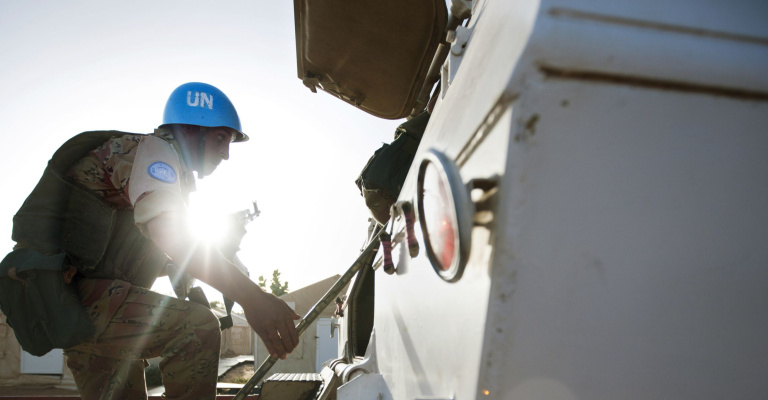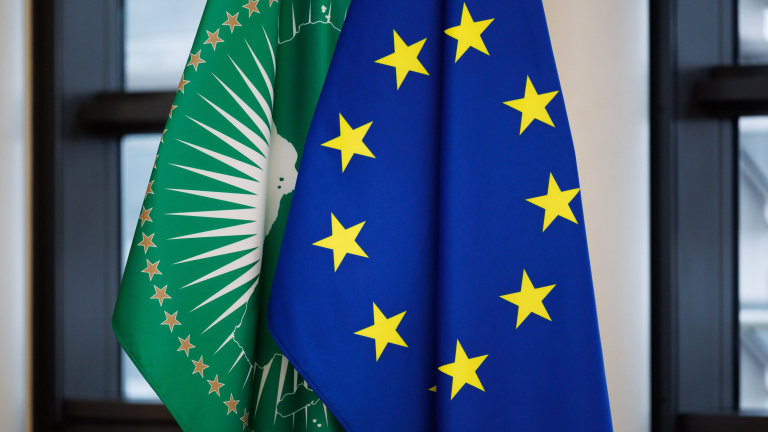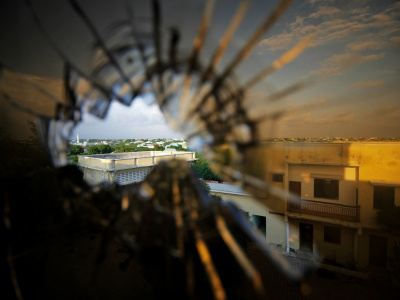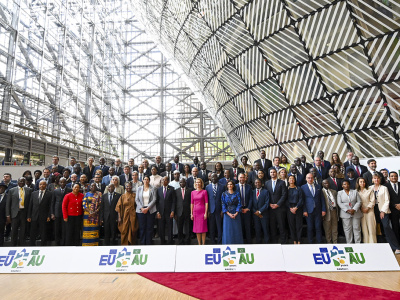
Beyond promises: The AU-EU summit must strengthen multilateral peace and security
The global order that so far shaped relations between Africa and Europe is shifting. Rising global levels of conflict expose the fragility of multilateral institutions that were once seen as pillars of global cooperation. At first glance, Africa and Europe may seem to sit on opposite sides of this transformation. Yet, for both, the functioning of an effective and legitimate multilateral peace and security architecture remains vital.
As the multilateral system tries to survive a phase of profound strain, ECDPM and SAIIA have worked together to analyse where European and African positions converge and identify how the upcoming summit could help reinvigorate the EU–AU partnership as a driver of multilateral renewal.
The stakes are high. Both continents depend on stable, effective and equitable multilateral rules to safeguard prosperity and security. Both face challenges related to credibility
AU-EU commitments to multilateralism
The EU-AU summit in Luanda (Angola), scheduled for 24-25 November 2025, takes place at a moment of uncertainty on the future of the multilateral system. For Africa and Europe, the stakes are high. Both continents depend on stable, effective and equitable multilateral rules to safeguard prosperity and security. Both face challenges related to credibility and effectively translating and implementing their foreign policy objectives at the global level. Both are trying to adapt to this ‘brave new world’ where traditional multilateral institutions no longer guarantee voice, stability or influence.
Africa and Europe recognise that acting alone offers little leverage. Their ability to navigate this transition will depend on building coalitions and strengthening cooperation rather than retreating into fragmented responses. The summit in Luanda offers the space to do this: an opportunity to move beyond familiar debates about Europe’s role in Africa and instead focus on how Africa and Europe can jointly position themselves within an evolving global landscape, as well as the concrete steps needed to make their partnership effective.
Neither can shape the international agenda alone, and both depend on institutions whose authority and capacity are eroding.
The central issue in Luanda will not simply be diagnosing the crisis of multilateralism and global institutions (and their root problems, which are known), but rather defining a shared reform agenda – especially on global peace, security and governance. Both regions agree that the current system (particularly the UN Security Council) is no longer representative, equitable, or capable of managing today’s challenges. Their approaches differ, but they share a crucial constraint: neither can shape the international agenda alone, and both depend on institutions whose authority and capacity are eroding.
This creates an unexpected and underutilised convergence. Europe’s influence is waning as emerging powers gain ground, while Africa remains underrepresented in global decision-making structures shaped by post-1945 power balances. The summit offers a platform to acknowledge shared constraints and outline a joint vision for a more inclusive and responsive multilateral order.
Shaping a joint agenda
This joint vision should be based on a fundamental rethink of how institutions distribute power, voice and resources. For Africa, legitimacy is the starting point. The 2005 Ezulwini Consensus – which calls for two permanent seats with veto power, and five non-permanent seats for African states in the UN Security Council – remains central to its reform agenda. African governments emphasise the urgency of structural reform to correct historical imbalances in representation. They also seek greater influence in international financial institutions and, in that sense, their message is clear: Africa wants to help shape and define global rules rather than simply adapt to decisions made elsewhere.
On its side, Europe and the EU agree that the system must evolve, but tend to prioritise procedural reforms as more immediately achievable, favouring gradual and negotiated processes, and arguing for equal consideration of all underrepresented regions. What is clear is that both sides see the same cracks in global governance – but they diverge on how deep and how fast the repairs should go. Luanda is the moment to narrow that gap and build a joint vision for a fairer and more effective multilateral order.
The world now measures partnerships by what they deliver, not by the language they use.
Peace and security as key tests at the AU-EU summit, and beyond
Peace and security will be perhaps the most urgent test of whether a shared approach is possible between Europe and Africa. When the UN adopted Resolution 2719 in 2023, it created a framework for the UN to fund AU peace operations through assessed contributions, which means drawing on the UN’s core budget rather than relying on ad-hoc donations. In practice, it opened the door for predictable, long-term financing for AU missions. This was a significant recognition of Africa’s growing role in stabilisation and a clear case where the EU and the AU joined forces to get this resolution adopted. Yet two years later, implementation has stalled. Making Resolution 2719 operational will require predictable financing, joint planning and stronger AU-EU-UN coordination.
Part of the answer might be an underwhelming one: are the EU and AU actually speaking to one another? Are the exchanges at technical level – beyond summits and annual consultative meetings – sufficient to establish a common understanding and effective collaboration between both sides? Investing resources in such day-to-day diplomacy and strategic communication might seem a tall order in an era where diplomacy at all levels is under huge pressure – but one that has been flagged on both sides as a crucial element.
How to make the summit meaningful
For the summit to be meaningful, three steps are essential.
First, both sides must face the reality that many countries no longer see global institutions as fair or reliable, but also that jointly they can establish an axis of credible multilateral reform. Rebuilding trust and more intense coordination to leverage areas of convergence and agreement will be essential if Africa and Europe want to promote a multilateral system that works and represents the new balance of power.
Second, Africa and Europe must turn UN Security Council Resolution 2719 into a reality, and operationalise it, underpinned by a rekindled EU-AU-UN cooperation with clear roles, funding arrangements and accountability.
Third, instead of delivering over-optimistic statements, the EU and AU must invest resources into the tedious work of more bilateral dialogue and technical-level exchanges.
Luanda should not become another missed opportunity in the cycle of aspirational declarations without follow-through. The world now measures partnerships by what they deliver, not by the language they use.
The views are those of the authors and not necessarily those of ECDPM.
|
In this episode of Europolis: the Global Europe podcast, Sophie Desmidt interviews Gustavo de Carvalho on whether Europe and Africa can move beyond old donor-recipient dynamics to become the "adults in the room": stabilising forces that champion multilateralism as others step back. The conversation dives into how the partnership is shifting from aid to investment, the test for the EU’s Global Gateway, and why a true partnership means discussing global security, not just African conflicts. Apple Podcasts | Spotify | YouTube (soon) |











